Readings Newsletter
Become a Readings Member to make your shopping experience even easier.
Sign in or sign up for free!
You’re not far away from qualifying for FREE standard shipping within Australia
You’ve qualified for FREE standard shipping within Australia
The cart is loading…






Omnibus films bring together the contributions of two or more filmmakers. Does this make them inherently contradictory texts? How do they challenge critical categories in cinema studies? What are their implications for auteur theory? As, David Scott Diffrient’s Omnibus Films: Theorizing Transauthorial Cinema fills a considerable gap in the history of world cinema and aims to expand contemporary understandings of authorship, genre, narrative, and transnational production and reception. Delving into such unique yet representative case studies as If I Had a Million (1932), Forever and a Day (1943), Dead of Night (1945), Quartet (1948), Love and the City (1953), Boccaccio ‘70, (1962), New York Stories (1989), Tickets (2005), Visions of Europe (2005), and Paris, je t'aime (2006), this book covers much conceptual ground and crosses narrative as well as national borders in much the same way that omnibus films do. Omnibus Films is a particularly thought-provoking book for those working in the fields of auteur theory, film genre and transnational cinema, and is suitable for advanced students in Cinema Studies.
$9.00 standard shipping within Australia
FREE standard shipping within Australia for orders over $100.00
Express & International shipping calculated at checkout
Stock availability can be subject to change without notice. We recommend calling the shop or contacting our online team to check availability of low stock items. Please see our Shopping Online page for more details.
Omnibus films bring together the contributions of two or more filmmakers. Does this make them inherently contradictory texts? How do they challenge critical categories in cinema studies? What are their implications for auteur theory? As, David Scott Diffrient’s Omnibus Films: Theorizing Transauthorial Cinema fills a considerable gap in the history of world cinema and aims to expand contemporary understandings of authorship, genre, narrative, and transnational production and reception. Delving into such unique yet representative case studies as If I Had a Million (1932), Forever and a Day (1943), Dead of Night (1945), Quartet (1948), Love and the City (1953), Boccaccio ‘70, (1962), New York Stories (1989), Tickets (2005), Visions of Europe (2005), and Paris, je t'aime (2006), this book covers much conceptual ground and crosses narrative as well as national borders in much the same way that omnibus films do. Omnibus Films is a particularly thought-provoking book for those working in the fields of auteur theory, film genre and transnational cinema, and is suitable for advanced students in Cinema Studies.